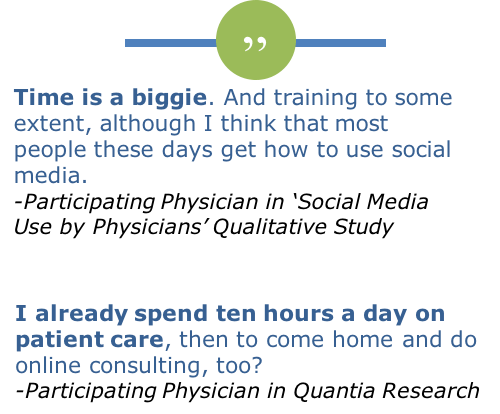In 2016, a Pew Research Center survey found that two-thirds of people worldwide used the Internet.1 With its broad reach and diversity of users and content producers, the Internet offers unique opportunities for individuals to inform, connect, and collaborate across the globe.
As technology has made social media more accessible, the popularity of online social interaction has grown. For example, a recent survey found that 68% of all adults in the U.S. are Facebook users.2
Global social networks and special interest forums have become gathering places for individuals from all walks of life to share and discuss ideas.
How are physicians using the Internet and social media in 2017?
Exact numbers vary, but most studies indicate that Internet usage by physicians now exceeds 80%.3 Physicians use social media for personal interactions as well as professional communication and research.
Social media usage by participants falls into three broad content categories: Creation, curation, and consumption. The breakdown of that usage follows a 1-9-90 pattern.
Approximately 1% of healthcare professionals using social media are content producers, creating and publishing original content. These physicians are creating blogs, forums, and information-sharing websites that provide information to ePatients and other healthcare professionals.
Another 9% engage with others on social media by commenting on posts and participating in group discussions or online chats. Content curation activities include identifying and sharing useful information or links with followers or other members of an online community.
Finally, 90% of physicians are social media consumers. These individuals use the Internet and social media to find and read relevant information related to their patients and practice.
Using online resources, physicians can access medical news and updates, clinical and diagnostic tools, drug databases, patient information, and more.4
How can physicians further leverage social media to communicate and interact with patients and peers?
Physicians can join the social media conversation by sharing useful information with their social network.
Using tools such as Twitter’s hashtag ontology makes it easy for physicians, researchers, and patients to find relevant content and discussions. These hashtags allow web users to locate content by category and tag their own relevant content so that it can be located by others.
Other methods of participating include joining disease- or condition-specific online forums or Facebook groups and answering questions on platforms such as Quora. Participation in online Twitter chats or Facebook Live streaming presentations allow physicians to interact in real time with peers and the public.
Physicians can also become content producers, creating original content to share with the broader Internet community.
What are the benefits of having a social media presence for physicians?
Social media provides a fertile ground for physicians who seek new learning and networking opportunities. Physicians can access millions of scientific journal articles using online portals.5 Webinars and video streaming provide further access to a growing global knowledge base.
Additionally, many physicians report that peer-to-peer interaction is one of the greatest benefits of social media. Physicians participating in social media exchanges report that they learn about evidence-based research and discuss new medical guidelines using Twitter and other social media platforms.6
When medical professionals share and discuss information from these resources, their knowledge base, and that of their peers, grows.
Being online also creates new avenues for physicians to network and gain name recognition. Author Dr. Stiegler notes that physicians in academia can bolster recognition of their work and name by making social media connections.
Physicians in search of speaking or teaching opportunities can use social media to connect with and demonstrate their knowledge to decision makers.
Finally, maintaining an active social media presence creates an online biography of sorts. Managing one’s online reputation is essential as patients now turn to the Internet for information before choosing a doctor.
What are some of the reasons physicians give for not using social media?
As the research indicates, most physicians have joined the conversation online at some level. Nonetheless, concerns remain in the healthcare community. Foremost among these concerns are the physician’s ethical and legal obligations.
Because a misstatement on social media can spread quickly through social sharing, some physicians are reluctant to share information or opinions online. They may also avoid statements that appear to provide a diagnosis due to professional ethics standards.7
Additionally, privacy rules loom particularly large as a reason why physicians are cautious about engaging with individual patients.
Supplementing these legal and ethical concerns are issues of logistics. Time is a precious commodity, and online interaction requires a time commitment.
Writing skills are also a concern for some physicians.8 While very knowledgeable in their fields, many physicians have no formal training in expository writing. These physicians may feel uncomfortable creating and sharing original content.
The Future of Social Media for Physicians and Patients
After weighing the benefits of increased social media engagement against the risks, more physicians are deciding to log on and connect.
With an increased use of digital medical records, personal virtual assistants, and wearable devices, we expect to see new and innovative ways for physicians and patients to interact through social media in the years to come. As this growth continues, new platforms and apps will develop to facilitate interactions and help more physicians become active social media participants.
References:
1. Pew Research Center, Smartphone Ownership and Usage Continues to Climb in Emerging Economies, February 22, 2016.
2. Pew Research Center, Social Media Update 2016, November 11, 2016.
3. referralMD, 30 Amazing Mobile Health Technology Statistics for Today’s Physician, 2017; See also, 2015 HIMSS Mobile Technology Survey, April 2015.
4. referralMD, 30 Amazing Mobile Health Technology Statistics for Today’s Physician, 2017.
5. Paul Hitlin, Health issues topped the list of scientific studies reaching wide audience in 2016, December 28, 2016.
6. Lauren Campbell, Yolanda Evans, Megan Pumper, and Megan A. Moreno, Social Media Use by Physicians’ Qualitative Study, July 2016.
7. MMS Physicians’ Guide to Social Media, March 2016.
8. Lauren Campbell, Yolanda Evans, Megan Pumper and Megan A. Moreno, Social Media Use by Physicians’ Qualitative Study, July 2016.










